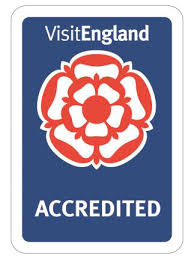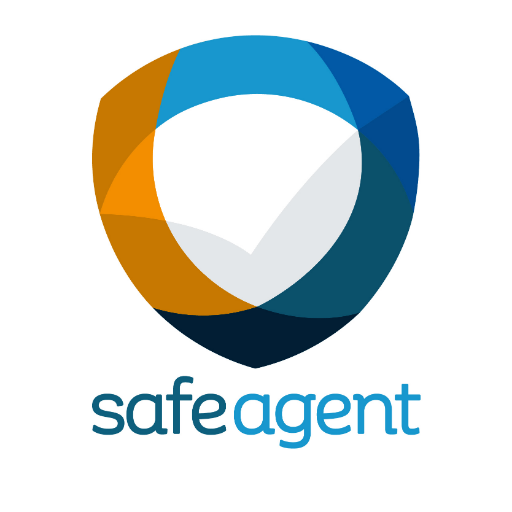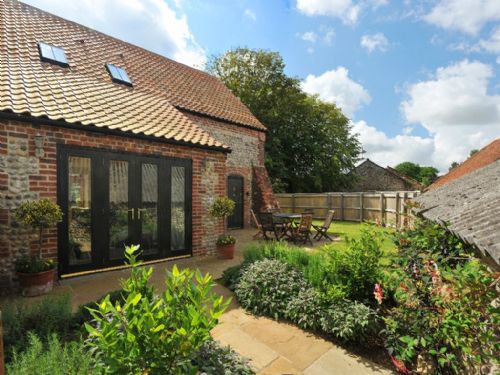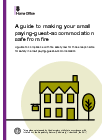Copyright © 2021 Landlord Direct.
Advertising, booking & smart pricing for holiday rentals
We offer owners an experienced & cost effective service for holiday rentals, we are not an automated online platform but a busy and friendly lettings team offering support and advice to our property owners. - Request our brochure - we channel manage our bookings on the best websites to advertise your holiday let such as Airbnb, Vrbo, and Booking.com to deliver a powerful advertising coverage for your holiday rental. We have flexible services to suit clients that range from multiple holiday let sites to single holiday cottage owners.
.Our holiday letting service includes:
- Airbnb, Vrbo, Booking.com & other major travel sites
- Smart Pricing included
- Rightmove included - to attract longer winter lets (if required)
- Book Direct webpage included - created for your holiday let optimised for google listings
- Registered Safe Agent - giving confidence to direct bookers
- Owner login to booking calendar
- Cleaners / manager automatically advised of each booking
- Full advice & back up - Are you ready for the proposed government Holiday Let Registration Scheme ?
- 7% PLUS VAT
The best websites to promote your holiday rental
We advertise your holiday home on the big hitting Online Travel Agent sites (OTA's) with an emphasis on the UK holiday market, we believe no other channel management service can beat our coverage. The main OTA's pull in many subsidiary advertising brands such as Expedia, and we also attract longer winter stays for your holiday let by selective advertising on Rightmove.
.png)
Your owner webpage to attract direct bookings
We design a webpage for your property ( included within our service), which is heavily optimised to attract google listing, giving you the opportunity to attract direct bookings for your holiday let.
Booking Calendar
Included on your webpage will be a holiday let calendar that shows the prices and availability for your property. (We can link to our client’s own ical booking calendar systems if required). Our booking staff handle these direct enquiries on your behalf.
We can operate in any UK location
Our clients range from:
- Individual holiday cottage owners,
- Larger operators with groups of holiday lets
- City serviced apartments
- Second home 'levelling up lets'
- Winter lets typically 1 to 3 month lets
Examples
- COTSWOLDS
- LIVERPOOL - Albert Dock
- PEAK DISTRICT
- ANY LOCATION -Contact Us To Discuss Your Holiday Let
Step 1
Advertising & channel management of your holiday let
We will list your property on powerful Online Travel Agents , now household brand names. We will utilise these commission bearing marketing websites & build in the advertising commissions into the tariffs charged to the guests.
We channel manage all the different Online Travel Agents from our master ical calendar that links to the OTA’s preventing double bookings. ( we can link to our client’s own ical booking calendar systems if required).
We set the intricate pricing required for your property, to take account of seasonal pricing, short stay pricing, and late availability if required. This pricing is agreed with you then entered on each O.T.A. system and managed & updated as required.
Step 2
Direct booking webpage for your property
We create a webpage for your property on our website. optimised to achieve high google listings and to attract direct bookings for your holiday let.
Step 3
Handle Bookings
Email or telephone enquiries link through to the Landlord Direct Lettings Office, and our staff handle these booking enquiries on your behalf.
We stick to your letting criteria and your do’s and don’ts. We have a full consultation with you, we list the services you include with your cottage on your booking page, and also the ones you prohibit, so our booking staff can refer to your booking criteria at all times.
We sync and up date all booking calendars on all sites, to prevent double bookings.
Step 4
Handle payments
We take payments from guests via the Online Travel Agent websites or directly if they come through our own website. We take payments by Visa and other Debit Cards or by bank transfer.
Insured Client Account
We arrange payments due to you monthly along with a statement of account. All client monies are held in insured client accounts. This gives peace of mind to both owners and guests.
We arrange payments to you along with statements of account. We are a registered 'Safe Agent' all client monies held are protected by client money protection insurance. (Set to be a legal requirement for all agents in 2019) All client monies are held in insured client accounts. This gives peace of mind to both owners and guests.
Please send us some pictures of your holiday cottage / short stay property by using our image uploader
Our image upload will automatically resize your photos and then email them to us.
For further information please contact Landlord Direct
Need An Energy Performance Certificate - Legal Requirement
All holiday cottages must now have an EPC Energy Performance Certificate, they typically cost around £60 and last for 10 years.
Need Smoke Alarms or Carbon Monoxide Alarms Fitting - Legal Requirement
.
Read up to date fire health and safety requirements :
Landlord Gas Safety Certificates - Legal Requirement
Whether Calor or Mains gas, it is a legal requirement for holiday cottage owners to obtain a 'Landlord Gas Safety Certificate' carried out by a Gas Safe engineer annually, we would recommend
Calor Gas Suppliers
For Calor Gas ref-fills or to set up new storage tanks or the supply of Calor cookers
Electrical Certification & PAT Testing
We would recommend that you obtain a 5 year periodic electrical certificate for your holiday let, and arrange for all portable electrical items PAT tested annual.
Open Fires & Log Burners
Make sure all flues and chimneys are swept at least annually and keep the receipt or certificate. Visually check the condition of log burner flue seals and arrange for repairs of you feel they may need resealing. An air vent in an external wall in the same room as the log burner should be in place, and a carbon monoxide alarm as mentioned above. If you intend letting your property to families we would suggest that you supply a fire guard to open fires and log burners.
Fire Risk Assessment
Landlord Direct will help you write a fire risk assessment for your holiday let if it is a standard holiday cottage this should be a straight forward matter. shortstay@landlorddirect.com
Holiday Let Insurance
Holiday let property must have a specialist insurance policy in place, general buy to let insurance is unlikely to cover the holiday let 'short stay' use. There are therefore specialist insurance brokers out there who are set up to secure you the correct insurance policy on good terms. Apart from insuring the actual fabric of the building, these policies protect cottage owners against Public Liability claims, absolutely essential when you have paying guests staying.
Authority From Lender
You may already have purchased your property on a Buy to Let mortgage, however if you have a lender for the property , please check with them that you are able to let out the property as a Furnished Holiday Let
Occupancy Rules
To qualify as a furnished holiday let, your cottage must be advertised and available to let for at lease 210 days per annum.
Professional Photos
With modern cameras it does not always seem necessary to employ a professional photographer to take pictures of your holiday let property. However we would very strongly recommend that you use a professional photographer who will have the correct back lighting, wide angled lenses and softening filters that get those Wow factor photos!
Immigration (Hotel Records) Order 1972 - Keep Records Of Your Bookings
The Immigration Order places a legal duty on all owners or the managers of all serviced and self-catering accommodation to keep a record for at least 12 months.
To comply with the Immigration (Hotel Records) Order 1972 you need to collect the following information from ALL guests over 16 years old on their arrival:
- full name
- nationality.
- Note: you are not legally required to take a guest's home address or contact number.
For all who are not British, Irish or Commonwealth guests:
- passport number and place of issue (or other document which shows their identity and nationality)
- details of their next destination (including the address, if known) on or before departure.
The Landlord Direct booking service is designed to capture this needed information and we keep appropriate records.
The Equality Act 2010
Although some holiday cottage owners do not allow pets, under the Equality Act all holiday cottage owners cannot refuse a booking from a registered blind person accompanied by their guide dogs. Further the act states owners should do anything that is practically reasonable to assist a disabled guest.
Bunk Beds Regulations
prohibit the supply of bunk beds which could cause a child to be injured or killed, as a result of their becoming wedged or trapped. A bunk bed must not have any: • gap in the bed base greater than 75mm (approx. 3”) • gap elsewhere which is less than 60mm (approx. 2.5”) or more than 75mm Any gap permitting access to the raised bunk should only be in the safety barrier on one of the long sides of the bed, and be of a minimum width of 300mm (12”). Note: The safety of mattresses is discussed separately in the section on upholstered furniture. By means of simple measurement, you should be able to make sure whether a bunk bed satisfies the ‘gap’ requirements detailed above. If you are in any doubt about a particular gap size, you should contact your local Trading Standards Service to arrange for more accurate measurements to be made with a special probe. The general safety of bunk beds can be simply tested by checking for such things as stability, rigidity, sharp edges etc. Some bunk beds may also be marked with a British Standard number. This is currently BS EN 747
Furniture Regulations
Most holiday cottage owners will by new furniture and soft furnishings which will have to meet up to date regulations, however older furniture should always be checked.
make sure all your furniture and furnishings meet the regulations. They must carry an appropriate permanent label at point of sale.
- Keep all purchase receipts – be extra careful if buying used furniture.
- It is safest to buy new from a reputable retailer.
- It is an offence for retailers to sell no-complying items.
- If in doubt, consult your local Trading Standards Office.
What do the Regulations Say?
As from 1st January 1997 all furniture in tenanted residential property must comply with the 1993 amendments to the Furniture and Furnishings (Fire) (Safety) Regulations 1988 which extends the scope of the Consumer Protection Act 1987 (CPA). This covers the supplying (hiring or lending) of specified goods (upholstered furniture and certain furnishings) “in the course of business”.
A landlord letting her own home over an extended period, perhaps to different tenants, would be deemed to be “letting in the course of business” and would need to comply. We would therefore strongly recommend that anyone, regardless of whether they see themselves as running a business or not, should make absolutely sure they are complying with these regulations.
Prescribed Items
The regulations apply to:
- Arm chairs, three piece suites, sofas, sofa beds, futons and other convertible furniture.
- Beds, Bed bases and headboards, mattresses, divans and pillows.
- Nursery furniture
- Garden furniture which could be used indoors
- Loose, stretch and fitted covers for furniture, scatter cushions, seat pads and pillows.
Excluded Items
- The regulations do not currently apply to:
- Antique furniture or furniture manufactured before 1950
- Bed clothes and duvets
- Loose mattress covers
- Pillowcases
- Sleeping bags
- Curtains
- Carpets
Compliance
Furniture which complies carries a manufacturer’s label which must be permanent and non-detachable.
All upholstered items must have fire resistant filling material.
All upholstered items must pass the “match resistance test” as prescribed.
All upholstered items must also past the “cigarette test” as prescribed.
Bed bases and mattresses are not required to bear a permanent label but compliance will be indicated if the item has a label stating that it meets BS7177
Due Diligence – What Landlord’s Should do!
In the event of a tenant complaint or an incident the defence of “due diligence” may be accepted where it can be shown that the landlord or agent took all reasonable steps to avoid committing an offence – you will need documentary evidence of this.
A private owner letting a single dwelling (his or her own home – not in the course of business) may in theory have some arguement for defence, whereas an agent acting on his behalf will not. However, an agent merely introducing a tenant and not becoming involved in the inventory or management of the tenancy my well be exempt from liability.
Legionella Checks
“someone who rents out a building or accommodation” including holiday cottage owners have a responsibility to prevent and risk control exposure to Legionella.
The best solution is to pay a specialist contractor to carry out a Risk Assessment. If it reports a low risk it is unlikely you will need to re-assess annually perhaps every 5 years or of there is a material change
Window Blind Cords
Window blind cords need to be fixed high enough off the ground to prevent young children being at risk, this is a legal requirement for all rental property some blinds are fitted with a easily detachable catch .
Safe Use Of Cleaning Substances
Always store cleaning products and chemicals in a place that cannot be reached by children. Do not store cleaning products in base kitchen units or low level cupboards. Ideally let your cleaners bring their own cleaning products , and do not store any products in your holiday let, apart from washing up liquid and bathroom soaps.
V.A.T.
Most holiday cottage owners, will not derive a turnover of more than £ 82,000 per year , and so will not have to charge V.A.T.
PADSTOW -- ST. IVES -- PEAK DISTRICT -- BELVOIR -- STAMFORD -- RUTLAND




